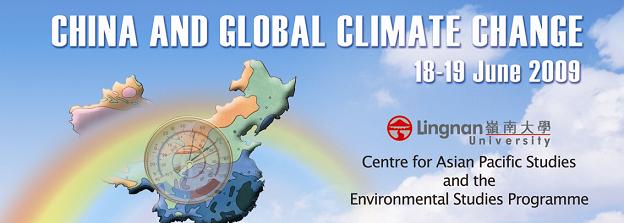
Event Title
Conference on China and Global Climate Change : Reconciling International Fairness and Protection of the Atmospheric Commons
Location
AM308, Lingnan University
Start Date
19-6-2009 4:00 PM
End Date
19-6-2009 5:30 PM
Language
English
Description
Climate change presents significant scientific, technical, ethical and political challenges. Attitudes to climate change are a function of tradition and culture, and the prevailing discourses in society and the media. Educators have a key role in understanding these attitudes and promoting behavioural changes. However, the transdisciplinary nature of the issues can present a problem for staff and students alike. While it is relevant to many, or most, areas of the curriculum, traditional discipline and organisational boundaries, and the knowledge, skills and educational history of both staff and students, can prevent engagement. Examples include teaching the concepts in non-science courses, engaging science disciplines with the political and ethical issues, and developing the understanding of responsibility and its relevance in vocational, business-related courses.
In this paper I describe a review of courses across a higher education institution to understand how climate change is incorporated into the curriculum, and the development of teaching and materials for use across disciplines. Examples and discussion will be contextualised to China and its role and position in global climate change issues.
Document Type
Presentation
Recommended Citation
Willott, J. (2009). Embedding climate change in the curriculum. In China and global climate change: Proceedings of the conference held at Lingnan University, Hong Kong, 18-19 June 2009 (pp. 582-595). Centre for Asian Pacific Studies and the Environmental Studies Programme, Lingnan University, Hong Kong.
Included in
Embedding climate change in the curriculum
AM308, Lingnan University
Climate change presents significant scientific, technical, ethical and political challenges. Attitudes to climate change are a function of tradition and culture, and the prevailing discourses in society and the media. Educators have a key role in understanding these attitudes and promoting behavioural changes. However, the transdisciplinary nature of the issues can present a problem for staff and students alike. While it is relevant to many, or most, areas of the curriculum, traditional discipline and organisational boundaries, and the knowledge, skills and educational history of both staff and students, can prevent engagement. Examples include teaching the concepts in non-science courses, engaging science disciplines with the political and ethical issues, and developing the understanding of responsibility and its relevance in vocational, business-related courses.
In this paper I describe a review of courses across a higher education institution to understand how climate change is incorporated into the curriculum, and the development of teaching and materials for use across disciplines. Examples and discussion will be contextualised to China and its role and position in global climate change issues.

